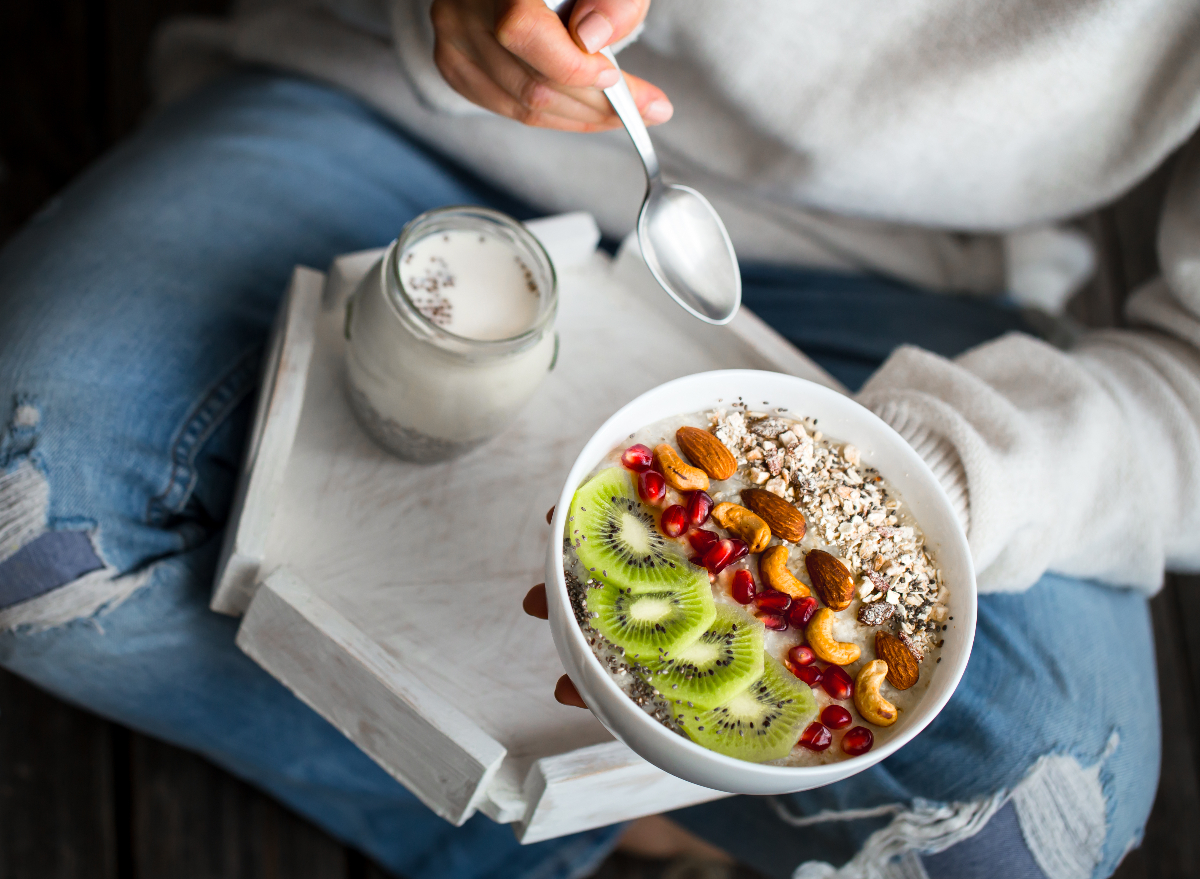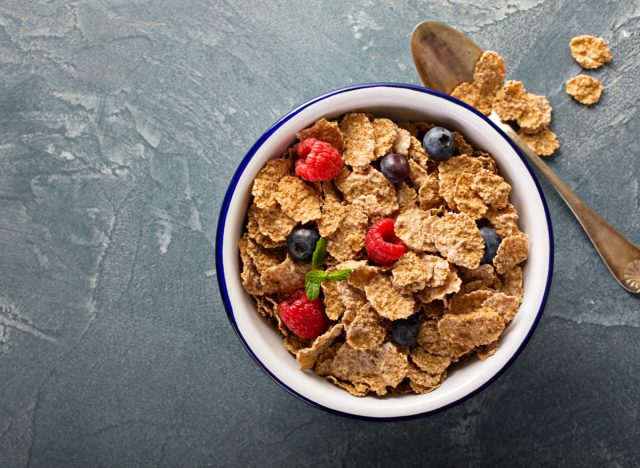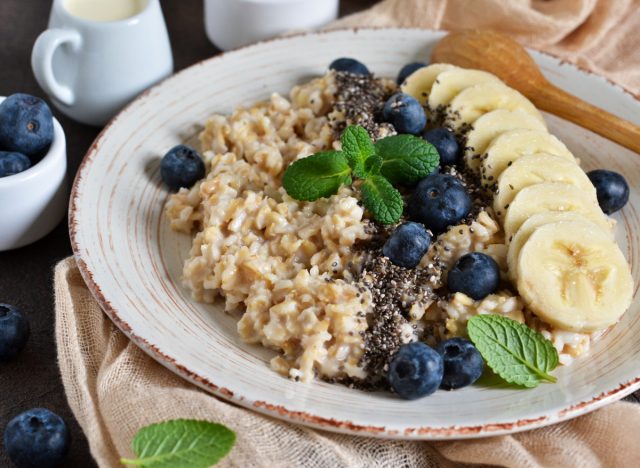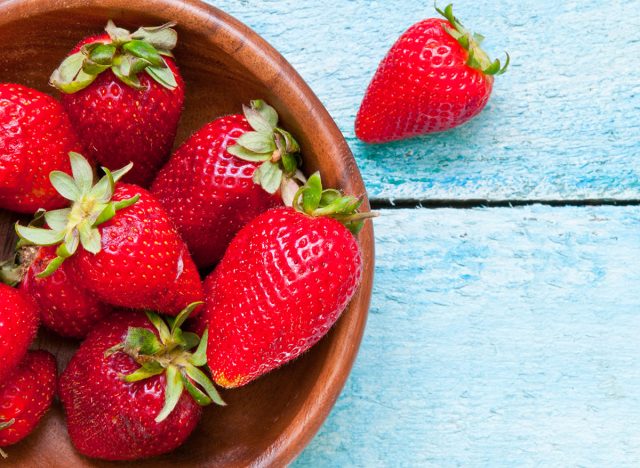6 Best Breakfast Habits To Slow Aging

Aging is a beautiful—but admittedly hard—part of life. While you may not be able to control the rate at which the effects of aging impact your looks and appearance, how and when you fuel your body with food can help you move and feel as if you're younger than the actual age written on your birth certificate. This can start with your first meal of the day: breakfast.
"Many of us obsess over how we age on the outside—with concerns about wrinkles on our faces, bags under our eyes, and our hair streaked with gray. But it's healthy aging from the inside that we should focus our energy on," explains Bonnie Taub-Dix, RDN, author of Read It Before You Eat It: Taking You From Label to Table, and the creator of BetterThanDieting.com.
Although you can't push back your biological clock, Taub-Dix notes that you can help to slow the aging process down by taking a closer look at what you put inside your body instead of only focusing on the exterior.
"If you have a car and you fill its tank with premium gas, keep it clean, do oil changes when they are due, change the filters when necessary, do your wheel rotations and alignments, you will have a mint car that will last you a longer time. It's the same with our bodies," says Sandra Arévalo, MPH, RDN, CDN, CLC, CDCES, FADA, and national spokesperson for the Academy of Nutrition and Dietetics. "If we treat it the right way, feeding it with the right nutrients, we will keep it healthier and younger longer."
The best news? You can start implementing quality breakfast habits to help deter the physical repercussions of aging at any point—even today! To help get you started making healthier eating choices able to preserve your youthful vibrancy, we asked a couple of dietitians to weigh in with their thoughts on the best breakfast habits to slow down the aging process.
Eat breakfast—don't skip it!

One of the easiest habits you can implement to delay signs of aging is simply not skipping breakfast. Instead, prioritize eating this important meal each and every morning to get your metabolism going.
"Eating some breakfast is often more important than what you eat for breakfast," explains Arévalo. "Big or small, there are peer-reviewed studies that indicate that eating earlier in the day helps to improve your cardiometabolism. This means that you will have a healthier heart, prevent diabetes and cardiovascular diseases, and even lose weight. The better you feel, the younger you are."
Eat cereals rich in tryptophan.

Even if you don't get a full night's sleep, looking and feeling rested can still help you feel younger.
"To avoid looking tired and start looking your best in the morning, start by eating cereals that contain tryptophan. Oatmeal, whole wheat cereals, and chia seeds are higher in tryptophan," says Arévalo. "The body uses tryptophan to help make melatonin and serotonin. Melatonin helps to regulate the sleep and wake cycle, and serotonin has a role in the regulation of appetite, sleep, and even pain. Tryptophan is [also] needed to produce niacin—[aka] vitamin B3—which is needed for energy and DNA production."
Cook up oatmeal or make overnight oats rich in fiber.

Another awesome benefit of oatmeal and other whole grains? They are high in fiber content, which is both filling and great for your cardiovascular health.
"Oats contain soluble fiber, which is necessary to help lower cholesterol levels and support heart health," says Taub-Dix. "Try a swirl of nut butter or chia seeds to your steamy bowl of oatmeal to boost satisfaction and fiber content even further."
If you're not in the mood for a hot breakfast, you can also try making overnight oats.
"Combine oats with Greek yogurt, your favorite fruit, nuts, chia seeds, or some of your favorite add-ons," says Taub-Dix. "Leave it in the fridge overnight, and you'll wake up to a breakfast that will hold you till lunch."
Eat strawberries.

Strawberries are anti-aging must-haves at breakfast because of how their vitamin and nutrition content supports the healthy development of your skin and bones.
"The vitamin C in strawberries helps to promote the formation of collagen, essential for healthy skin and bones," says Taub-Dix. "Just one serving of strawberries provides the vitamin C you need for the day."
In addition to offering natural sweetness that can potentially minimize your desire for more added sugar in your breakfast, Taub-Dix also mentions strawberries provide potassium, which is beneficial to heart health, and are a great source of fiber, which is essential to digestive health.
Replace carbs with protein.

Upping the amount of protein in your breakfast can have serious anti-aging benefits, particularly in terms of your cognitive abilities.
"Eating more protein foods—such as eggs, cheese, and yogurt—and less carbohydrates at breakfast help keep your mind young," says Arévalo. "Studies indicate that replacing just 5% of your carbs for protein helps prevent cognitive decline. The same effect is seen when consuming plant proteins such as vegan cheese, tofu, or nuts."
Add almonds to your omelet.

Never thought to add nuts to your omelet? Well, according to Taub-Dix, it's one of her breakfast faves.
"I love sprinkling sliced almonds on my omelets to add a delicious crunch, plus some plant protein," says Taub-Dix.
If retaining your youthfulness while slowing the effects of aging on your body are among your top-of-mind concerns, give this protein-packed recipe a try for breakfast. For less adventurous eaters, know that even on their own, almonds can provide a powerful protein punch. Plus, they can help lower cholesterol and are a good source of calcium and fiber.
"Almonds have been shown to decrease LDL [aka "bad"] cholesterol levels while providing healthy fats to support heart health. They are also the nut richest in calcium, the key nutrient needed to keep our bones strong, especially as we age," explains Taub-Dix. "These nuts claim first place when it comes to fiber—a nutrient that's a necessity to help prevent constipation and fuel the good bacteria in your gut."









